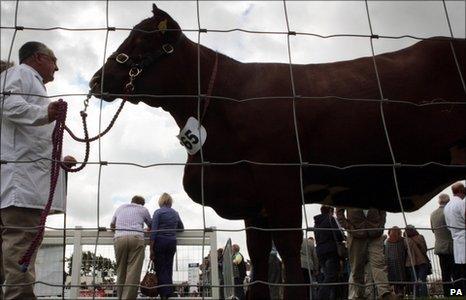Show goes on despite cuts concern
- Published

Farmers have expressed fears for the future in the wake of the UK Budget
The Royal Highland Show is a showcase for the country's finest pedigree livestock and for food producers and retailers.
Farming and food and drink are two significant sectors of the Scottish economy, and there was a mixed reaction to the UK Budget emergency budget, with many farmers attending the event expressing concern about their future.
Hebridean sheep farmer Gordon Johnston, said: "Seven neighbouring farms in the last 10 years have gone bust.
"All the remaining farms around me have someone who has to go out and earn a wage because they cannot live off the farm income alone."
Willie Templeton, of Catrine House Farm in Ayrshire, made the decision to diversify three years ago because he could not make money from his herd of 145 dairy cows.
"We make ice cream from the milk and we have a coffee shop and open farm," he said, adding: "The last two years business has been really good in this respect but now we have a concern that the public spend will be reduced."
Details of the new UK government's first budget are still emerging, but Jim McLaren, of the National Farmers' Union in Scotland, said there was little in it to make their life easier.
"We'd like to have seen the reintroduction of agricultural buildings allowance," he said.
"We'd like to have avoided the reduction in capital right off. It was £50,000 per year and been brought down to £25,000, that could stifle a bit of investment.
"The VAT one, farmers as businesses can mostly reclaim the VAT so we're less concerned about that, still looking for some fuel duty light at the end of the tunnel there because obviously rural Scotland fuel is a massive part of our ongoing daily cost."
Subsidy cuts
Sales of Scottish food and drink have grown by 30% in the past three years and are worth £425m to the economy.
The Scottish government believes the speed of the budget cuts could reverse this trend.
Environment Secretary Richard Lochhead, said: "Some of the measures taken could dent consumer confidence in the retail market place which will harm food and drink potentially.
"We've got to try and avoid that, and also the potential 25% cuts of departmental budgets across Whitehall will have an impact on my own budgets here in Scotland."
It is not just the Scottish and Westminster budgets that are being cut - EU farming subsidies could also be reduced.
As the UK government prepares for negotiations on the reform of the Common Agricultural Policy, the European commissioner has been meeting with Scotland's farming community.
EU Agricultural Commissioner Dacian Ciolos, said: "Scotland has a very strong agriculture especially based on animal production and I can see in Brussels the very strong interest of Scotland in the future of the common agricultural policy."
Consumption 'up'
These may be challenging times for farmers, but interest in Scottish produce has never been higher and many in this sector remain confident about their future.
David Urquhart, joint managing director of whisky specialists Gordon & MacPhail, said: "I think we're delighted in the Scots Whisky Industry about the budget.
"We didn't get hit with an increase in duty again which was rumoured but also they're going to look at all the different categories and how the taxation is going to work going forward."
Maitland Mackie, chairman of ice cream-maker Mackies of Scotland, added: "Our own particular business is a bit sheltered, because, as people in the downturn that's going on don't go on holiday and don't buy a new car, they tend to reward themselves with the best bit of chocolate and a good bit of ice cream to eat."
And Martin Grant, commercial director of fine food company Mackays, said: "Food is always a good market to be in a recessional time.
"People need to eat, home consumption goes up and if you make a good value good quality product that appeals to people they will buy it again and again and again."
So far, the food and drink sector is holding up well as customers treat themselves to little luxuries when they cannot afford bigger purchases.
It brings in about £70m annually for the Scottish economy - but will the farming industry on which it relies be quite as buoyant in times of austerity?
- Published22 June 2010
- Published23 June 2010